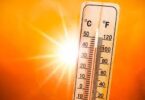BERLIN (AP): A blanket of hot air stretching from the Mediterranean to the North Sea is bringing much of Western Europe its first heat wave of the summer, with temperatures forecast Friday to top 30 degrees Celsius (86 degrees Fahrenheit) from London to Paris.
Experts said the unusually early heat wave was a sign of what’s to come as global warming continues, moving up in the calendar the extreme temperatures that Europe would previously have seen only in July and August.
“In some parts of Spain and France, temperatures are more than 10 degrees higher — that’s huge — than the average for this time of year,” Clare Nullis, a spokesperson for the World Meteorological Organization in Geneva, said.
In France, some 18 million people woke to heat wave alerts affecting about a third of the country Friday. Forest fire warnings were issued from the Pyrenees in the south to the Paris region.
Tourists dunked their feet in fountains near the Eiffel Tower or sought relief in the Mediterranean. A restaurant server rested under a lonely tree as the heat baked the port city of Marseille in southern France.
France has introduced numerous measures to cope with extreme summer temperatures following a deadly heat wave in 2003 that killed about 15,000 people.
On Friday, schoolchildren were allowed to stay home in the 12 French regions in the southwest and west that were under the highest alert. The government stepped up efforts to ensure nursing home residents and other vulnerable populations could stay hydrated.
Temperatures in France have mounted all week and were expected to hit over 40 C (104 F) in the country’s southwest on Friday, and in the Paris region on Saturday. Nighttime temperatures are also unusually high, and the heat is stretching to normally cooler regions in Brittany and Normandy on the Atlantic Coast.
Matthieu Sorel, a climatologist at national weather service Meteo France, told public broadcaster France-Info that temperatures are expected to break several records. He called the exceptionally early long stretch of hot weather a “marker of climate change.”
Britain’s Met Office said global warming has increased the average temperature of U.K. summers – and the likelihood of more extreme temperatures during hot spells and heat waves.
“Reaching 34 C during June is a rare, but not unprecedented, event in the historical climate records for the U.K.,” said Mark McCarthy, head of the Met Office’s National Climate Information Center. “But if it should happen this week, it would be notable that it would have occurred on three days during the last six Junes.”
Before 2017, the last three times the U.K. recorded June temperatures of 34 degrees Celsius (93.2 F) or higher were in 1947, 1957 and 1976.
Germany’s national weather service DWD predicted that the big sweat would continue over the weekend, as the heat moves eastward into central and Eastern Europe. The hot weather follows an unusually dry spring in Western Europe, with authorities ordering water to be rationed in northern Italy and parts of France.
Experts say that climate change is already affecting rainfall patterns and evaporation rates across the region, with knock-on effects for agriculture, industry and wildlife.
“Heat waves are starting earlier,” said Nullis, the U.N. weather agency spokesperson. “They’re becoming more frequent and more severe because of concentrations of greenhouse gases in the atmosphere, which are at record level. What we’re witnessing today is, unfortunately, a foretaste of the future.”
She noted that extreme temperatures hit other parts of the globe in recent weeks. Nearly a third of Americans were under some form of heat advisory this week. During months of scorching temperatures, India and Pakistan saw the mercury scrape past 50 C (122 F) in some places.
The current heat wave in Europe started almost a week ago in Spain, where temperatures reached up to 43 C (109.4F). Spanish authorities hope the weather will begin to cool again Sunday.
The intense temperatures and a lack of rain has helped fuel wildfires across Spain, taxing firefighting capacity.
Politicians and experts met Friday in Madrid to discuss ways to tackle drought and the increasing spread of deserts across the globe.






